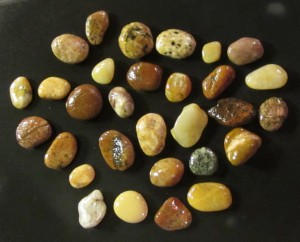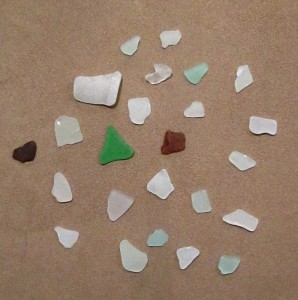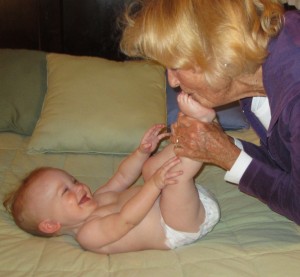September never fails to include a few lovely summer days, and today was one of them. Rather than have my devotions at home, I grabbed Jack and headed for the beach, our shared favorite place.
 While he romped in the dunes and did happy dances upside- down on the sand, I took a few minutes to walk the wave line looking for pretty stones and the occasional piece of beach glass.
While he romped in the dunes and did happy dances upside- down on the sand, I took a few minutes to walk the wave line looking for pretty stones and the occasional piece of beach glass.
Since the waves were small today, the stones were small, too. “Mini’s” we call them. But they’re every bit as pretty as their larger counterparts. Walking along slowly picking up stones, I spotted a piece of aqua-tinted beach glass. A few feet further there was a brown one, then two frosty-white ones. Step-after-step I found more and more until I had 24 in all, quite an unusual yield for a short strip of beach.
 It’s interesting that beach glass is man-made and stones are God-made. Both are frequently taken home as treasures, but they’re very different from one another. The bits of etched glass are glamorous, rare, the “celebrities” of beach finds. Attractive stones are more common, easier to find, and have no special sparkle.
It’s interesting that beach glass is man-made and stones are God-made. Both are frequently taken home as treasures, but they’re very different from one another. The bits of etched glass are glamorous, rare, the “celebrities” of beach finds. Attractive stones are more common, easier to find, and have no special sparkle.
People come in those two varieties, too. Some sparkle with fame and fortune, whether through Hollywood, Washington DC, Wall Street, or even in a pastorate. We can easily become enamored with these superstars, putting them on mental pedestals, since the rest of us are much like commonplace beach stones by comparison. We’re ordinary and have no reason to grace a magazine cover or be interviewed on TV.
Because of the stark difference between celebs and non-celebs, we commoners can sometimes fall into the trap of wondering if we’re accomplishing anything significant in our lives. If we fall prey to this kind of analysis, though, God has some comforting news for us.
Let’s pretend we’re the beach stones, and the “movers and shakers” of this world are the beach glass. God is the one walking along the shore, except that he wouldn’t do what I did this morning, picking up only the choicest finds. He would arrive at the beach with a giant scooper big enough to lift every single piece off the sand, glass and stones alike. They’d mix together indiscriminately, and once he got us home, he wouldn’t separate us into separate piles. Every piece would be equally valuable.
 Picturing God on the beach behind the controls of a scooper is silly but expresses the truth that he loves each of us equally and offers eternal salvation to all in the same way. Living an ordinary life without sparkle or flash does nothing to diminish our “chances” with him. He loves us all, and when we say yes to him, he’ll take us home.
Picturing God on the beach behind the controls of a scooper is silly but expresses the truth that he loves each of us equally and offers eternal salvation to all in the same way. Living an ordinary life without sparkle or flash does nothing to diminish our “chances” with him. He loves us all, and when we say yes to him, he’ll take us home.
“God shows no favoritism. In every nation he accepts those who fear him and do what is right. This is the message of Good News…. that there is peace with God through Jesus Christ, who is Lord of all.” (Acts 10:34-36)




